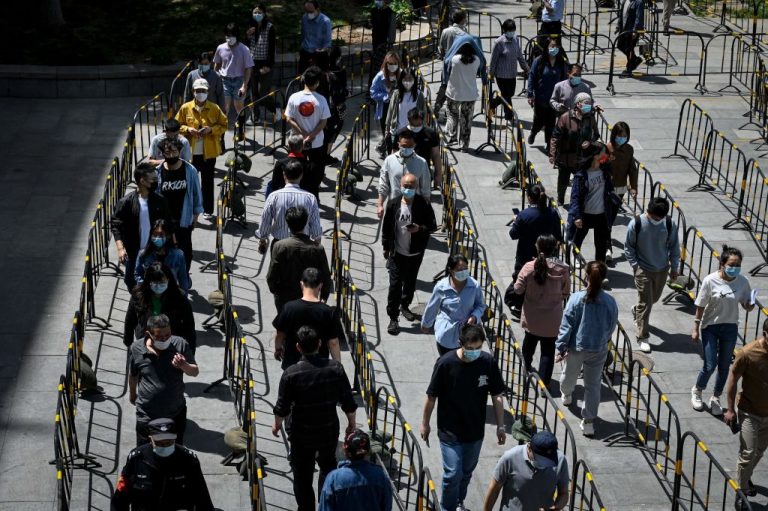Authorities across China have resorted to increasingly harsher measures in the face of public backlash to the Communist Party’s draconian “Zero-COVID” restrictions, which currently are impacting life and work for hundreds of millions of Chinese.
In addition to the epidemic prevention contingencies, police and censors have also been deployed to delete “rumors” about the human and economic costs of Zero-COVID, as well as pull pressure on Chinese who dare speak up about the conditions they face.
The recent lockdown of Shanghai, China’s largest city and financial center, caused much uproar both on-and-offline, as many of the city’s 26 million people were left without adequate food, essential supplies, and emergency medical access.
Demands of the anti-epidemic policies also placed massive strain on those carrying them out, with local DCD staff admitting that the system was completely overworked and stretched beyond its operational limits.
Despite this and the massive impact to the economy, Shanghai re-tightened its lockdowns after a brief relaxation in measures, due to the continued influx in COVID-19 cases. The city said it will stay under lockdown until the virus has been “completely eradicated from all its neighborhoods.”
Success
You are now signed up for our newsletter
Success
Check your email to complete sign up
China logged 21,796 new community-transmitted COVID-19 infections over the weekend of April 23-April 24, with the vast majority reported as asymptomatic cases in Shanghai. Across the country, many cities and provinces have enforced some degree of lockdown in hopes of quelling further spread of the virus.
READ MORE ON CHINA’S CORONAVIRUS SITUATION:
- Shanghai Reverses Decision to Loosen COVID Restrictions Despite Prolonged Suffering and Economic Damage
- Locked Down Shanghai Residents: ‘We Are at our Breaking Point’
- Patients Die Waiting Outside Shanghai’s Hospitals as Zero-COVID Lockdown Continues
Ordered to turn in passports
Police in the central Chinese province of Hunan have ordered local residents to hand over their passports, promising to return them “when the pandemic is over,” Radio Free Asia (RFA) reported.
Amid a growing number of people trying to leave the country, the Baisha police department in Hunan posted a notice on March 31 ordering employers to hand over the passports of all employees and family members to the police.
An officer who answered the phone at Baisha’s police department confirmed RFA’s report, and said the measure will be rolled out nationwide.
“According to official requirements, [passports] must be handed over because of the pandemic,” the officer said.
“It’s everywhere, not just Hunan. It’s across the whole country,” RFA reported. “Anyone with a passport has to hand it over, not just people who have an employer.”
“If people don’t hand them over … then they have to expect to be investigated.”
Beijing begins mass testing
Meanwhile, in Beijing, authorities have begun mass testing amid a recent surge in COVID-19 cases. The Chinese capital has kicked off mass testing for millions of residents in the Chaoyang district, where 29 cases were reported over the weekend, bringing the city’s total to 80 — the highest number the city has seen since the pandemic first began in Wuhan over two years ago.
According to a notice issued by the city’s disease prevention team, all 3.5 million residents in Chaoyang will undergo three rounds of mass testing, followed by an additional 10 additional districts and one economic development zone due for mandatory tests this week — covering a total of 20 million people.
Shanghai enacts stricter measures
On April 21, leading epidemiologist Zhang Wenhong said that more than 430,000 people had been infected in Shanghai. However, he claimed the death toll remained at only 25, or a death rate of under 0.1 percent.
Following Zhang’s statement, many people questioned the government’s statistics as the government has been known to conceal accurate figures. Some said on social media that their family members had passed away after being infected in mid-March, but their cases had not been listed in the government’s official death data.
Authorities in Shanghai have warned family members of deceased residents against speaking to the media. At least 27 seniors at Shanghai’s Donghai Hospital in the Pudong district perished as a result of the virus, with many more deaths suspected as a result of an outbreak among staff and patients.
On social media, people posted videos of green metal barriers that were erected over the weekend, with many expressing anger over the new restrictive measures after they were told just last week that the lockdowns would be loosened. According to state-media Caixin, the barriers are meant to leave main roads unblocked in order to speed up mass testing in the city.
In one video, residents leaving a building in Shanghai’s Xuhui district were seen breaking down a metal barricade as they expressed anger and frustration over the government’s relentless containment measures. Videos and photos showing pandemic prevention staff wearing white hazmat suits violently beating residents in order to uphold “Zero-COVID” orders have also emerged online.
Others have been forced into makeshift quarantine camps and hospitals, kept in harrowing conditions, unsure of when they will be allowed to leave.














